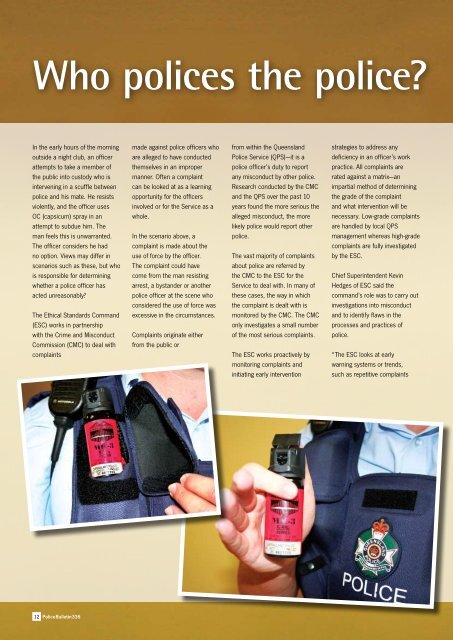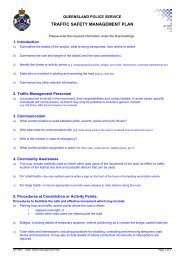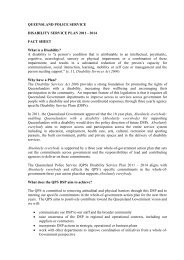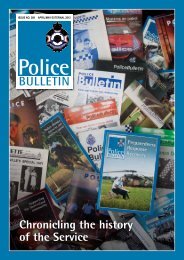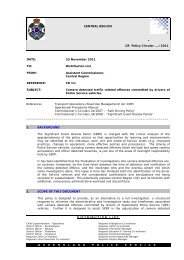Who polices the police? - Queensland Police Service
Who polices the police? - Queensland Police Service
Who polices the police? - Queensland Police Service
Create successful ePaper yourself
Turn your PDF publications into a flip-book with our unique Google optimized e-Paper software.
<strong>Who</strong> <strong><strong>police</strong>s</strong> <strong>the</strong> <strong>police</strong>?<br />
In <strong>the</strong> early hours of <strong>the</strong> morning<br />
outside a night club, an officer<br />
attempts to take a member of<br />
<strong>the</strong> public into custody who is<br />
intervening in a scuffle between<br />
<strong>police</strong> and his mate. He resists<br />
violently, and <strong>the</strong> officer uses<br />
OC (capsicum) spray in an<br />
attempt to subdue him. The<br />
man feels this is unwarranted.<br />
The officer considers he had<br />
no option. Views may differ in<br />
scenarios such as <strong>the</strong>se, but who<br />
is responsible for determining<br />
whe<strong>the</strong>r a <strong>police</strong> officer has<br />
acted unreasonably?<br />
The Ethical Standards Command<br />
(ESC) works in partnership<br />
with <strong>the</strong> Crime and Misconduct<br />
Commission (CMC) to deal with<br />
complaints<br />
made against <strong>police</strong> officers who<br />
are alleged to have conducted<br />
<strong>the</strong>mselves in an improper<br />
manner. Often a complaint<br />
can be looked at as a learning<br />
opportunity for <strong>the</strong> officers<br />
involved or for <strong>the</strong> <strong>Service</strong> as a<br />
whole.<br />
In <strong>the</strong> scenario above, a<br />
complaint is made about <strong>the</strong><br />
use of force by <strong>the</strong> officer.<br />
The complaint could have<br />
come from <strong>the</strong> man resisting<br />
arrest, a bystander or ano<strong>the</strong>r<br />
<strong>police</strong> officer at <strong>the</strong> scene who<br />
considered <strong>the</strong> use of force was<br />
excessive in <strong>the</strong> circumstances.<br />
Complaints originate ei<strong>the</strong>r<br />
from <strong>the</strong> public or<br />
from within <strong>the</strong> <strong>Queensland</strong><br />
<strong>Police</strong> <strong>Service</strong> (QPS)—it is a<br />
<strong>police</strong> officer’s duty to report<br />
any misconduct by o<strong>the</strong>r <strong>police</strong>.<br />
Research conducted by <strong>the</strong> CMC<br />
and <strong>the</strong> QPS over <strong>the</strong> past 10<br />
years found <strong>the</strong> more serious <strong>the</strong><br />
alleged misconduct, <strong>the</strong> more<br />
likely <strong>police</strong> would report o<strong>the</strong>r<br />
<strong>police</strong>.<br />
The vast majority of complaints<br />
about <strong>police</strong> are referred by<br />
<strong>the</strong> CMC to <strong>the</strong> ESC for <strong>the</strong><br />
<strong>Service</strong> to deal with. In many of<br />
<strong>the</strong>se cases, <strong>the</strong> way in which<br />
<strong>the</strong> complaint is dealt with is<br />
monitored by <strong>the</strong> CMC. The CMC<br />
only investigates a small number<br />
of <strong>the</strong> most serious complaints.<br />
The ESC works proactively by<br />
monitoring complaints and<br />
initiating early intervention<br />
strategies to address any<br />
deficiency in an officer’s work<br />
practice. All complaints are<br />
rated against a matrix—an<br />
impartial method of determining<br />
<strong>the</strong> grade of <strong>the</strong> complaint<br />
and what intervention will be<br />
necessary. Low-grade complaints<br />
are handled by local QPS<br />
management whereas high-grade<br />
complaints are fully investigated<br />
by <strong>the</strong> ESC.<br />
Chief Superintendent Kevin<br />
Hedges of ESC said <strong>the</strong><br />
command’s role was to carry out<br />
investigations into misconduct<br />
and to identify flaws in <strong>the</strong><br />
processes and practices of<br />
<strong>police</strong>.<br />
“The ESC looks at early<br />
warning systems or trends,<br />
such as repetitive complaints<br />
12 <strong>Police</strong> Bulletin 336
about excessive force when<br />
apprehending offenders,<br />
to determine what needs<br />
to be investigated,” Chief<br />
Superintendent Hedges said.<br />
Since 1990—immediately after<br />
<strong>the</strong> Fitzgerald Inquiry—<strong>the</strong> CMC<br />
(and its predecessor <strong>the</strong> Criminal<br />
Justice Commission) has been<br />
working with ESC to fight major<br />
crime, protect witnesses and<br />
streng<strong>the</strong>n integrity within<br />
<strong>the</strong> QPS. The CMC conducts<br />
research to address any systemic<br />
issues, policy and procedure<br />
deficiencies, or workplace issues.<br />
CMC Director of Complaints<br />
<strong>Service</strong>s Ms Helen Couper said<br />
<strong>the</strong> CMC was an independent<br />
oversight body responsible for<br />
promoting public confidence in<br />
<strong>the</strong> integrity of <strong>the</strong> QPS and <strong>the</strong><br />
way it dealt with misconduct.<br />
“The CMC has a close working<br />
relationship with <strong>the</strong> Ethical<br />
Standards Command and both<br />
parties meet weekly to discuss<br />
any issues of concern including<br />
those relating to specific<br />
complaints,” Ms Couper said.<br />
“We place a high value on this<br />
partnership and will continue to<br />
work with <strong>the</strong> QPS in <strong>the</strong> years<br />
to come to achieve even higher<br />
standards of accountability,<br />
integrity and performance.”<br />
"The CMC also conducts<br />
research about <strong>police</strong> powers and<br />
methods of operation. One policy<br />
that is currently under review is<br />
move-on powers, which allow<br />
<strong>police</strong> to move on a member of<br />
<strong>the</strong> public who is engaging in<br />
threatening behaviour."<br />
Ano<strong>the</strong>r key stakeholder working<br />
in partnership with <strong>the</strong> <strong>Service</strong><br />
is <strong>the</strong> State Coroner. The<br />
State Coroner has a signed<br />
Memorandum of Understanding<br />
with <strong>the</strong> CMC and ESC as to how<br />
deaths in custody are handled.<br />
If a person dies while in <strong>police</strong><br />
custody, trying to escape custody<br />
or while being put in custody—for<br />
example a suspected bank<br />
robber dies in a car crash<br />
while being pursued by a <strong>police</strong><br />
officer—<strong>the</strong>n an investigation is<br />
carried out by <strong>the</strong> ESC on behalf<br />
of <strong>the</strong> State Coroner. The CMC<br />
may also play an oversight role.<br />
Assistant to <strong>the</strong> State Coroner<br />
Detective Inspector Brendan<br />
Smith said at <strong>the</strong> completion<br />
of <strong>the</strong> investigation, <strong>the</strong> State<br />
Coroner was required to hold<br />
an inquest to take evidence and<br />
make a finding as to <strong>the</strong> cause of<br />
<strong>the</strong> death in custody.<br />
“The State Coroner may provide<br />
information to <strong>the</strong> Director<br />
of Public Prosecutions about<br />
suspicion of a criminal offence<br />
having occurred, or provide<br />
information to <strong>the</strong> CMC about<br />
suspicion of misconduct,”<br />
Detective Inspector Smith said.<br />
“The State Coroner may also<br />
comment on how to prevent<br />
similar incidents occurring in <strong>the</strong><br />
future.<br />
“When this is done, he forwards<br />
his advice to <strong>the</strong> QPS and <strong>the</strong><br />
Office of <strong>the</strong> Director of Public<br />
Prosecutions for consideration.”<br />
Chief Superintendent Hedges<br />
said taking responsibility for<br />
complaint handling and working<br />
in partnership with <strong>the</strong> CMC and<br />
State Coroner was just part of <strong>the</strong><br />
evolution of ensuring <strong>the</strong> <strong>Service</strong><br />
was properly <strong>police</strong>d.<br />
“Dealing with complaints is<br />
not just about identifying and<br />
addressing inappropriate conduct<br />
on <strong>the</strong> part of an individual,”<br />
Chief Superintendent Hedges<br />
said.<br />
“It is equally about identifying<br />
and addressing problems in<br />
<strong>the</strong> system and continuously<br />
improving <strong>the</strong> way we conduct<br />
our business. The focus is on<br />
learning from complaints, not<br />
looking at incidents in isolation.”<br />
By Karen Downey,<br />
Media and Public Affairs Branch<br />
<strong>Police</strong> Bulletin 336 13


